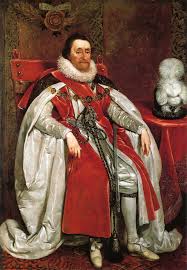
We can tend to neglect to study English history when we focus on early American history but it is imperative that we know what happened in England during the seventeenth century so we can better understand what happened in North America in the eighteenth century. One particular decisive event in English history, which had effects in America years later, was the ascension of James Stuart of Scotland to the throne of England.
James was born into the Scottish House of Stuart in 1566. He was crowned king of Scotland in 1597. During this time he wrote “True Laws of Free Monarchies” in which he laid down the principle of the “divine right of kings”. James declared that kings had a God-given authority that legitimized total power. He used this principle of “divine right” to take over the religious institutions of England and Scotland. He was crowned king of England in 1603 upon the death of Elizabeth I Tudor who left no heir.
In 1605, James survived a conspiracy to blow up the Parliament. This plot was called the Gunpowder Plot. Among the conspirators was Guy Fawkes. Speaking of Parliament, James I had quite a few squabbles with the English Parliament, mainly over financial matters. This eventually ended with the dissolution of Parliament in 1614 and total power in the hands of James and his elite friends and advisors until 1621.
James also attempted to consolidate the monarchy’s control over religion. He strictly enforced the rituals of the Church of England and persecuted dissenters including both Puritans and Separatists (Pilgrims). He also attempted to incorporate the Scottish kirk (church) into the Church of England and therefore came into conflict with Scottish Presbyterians. He also authorized a printing of the Bible in English: the King James Version in 1611.
When James Stuart died in 1625 he left a unstable political situation to his son, Charles. He had clashed with both Parliament and religious minorities including Presbyterians and Puritans. These groups were just the same groups that would clash violently with Charles I in the English Civil War, briefly ending the total power of the monarchy and replacing it with a Constitutional Republic under the Puritan Parliament and Oliver Cromwell.
The English Civil War had profound effects on the English colonies in North America. The Puritan population of New England was profoundly influenced by Cromwell’s government and the beginnings of dissatisfaction with the king came when the monarchy was restored in 1660. Jamestown and Plymouth colonies were founded during James’ reign and these settlements would provide the foundation for the Thirteen Colonies.
